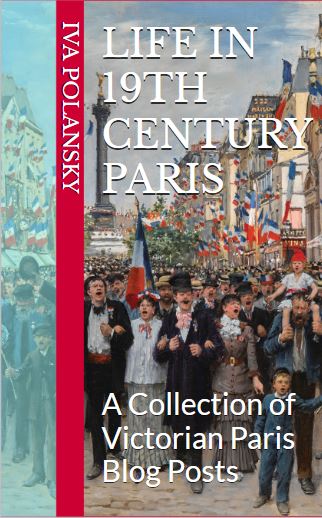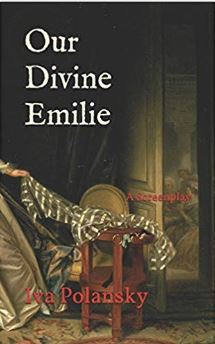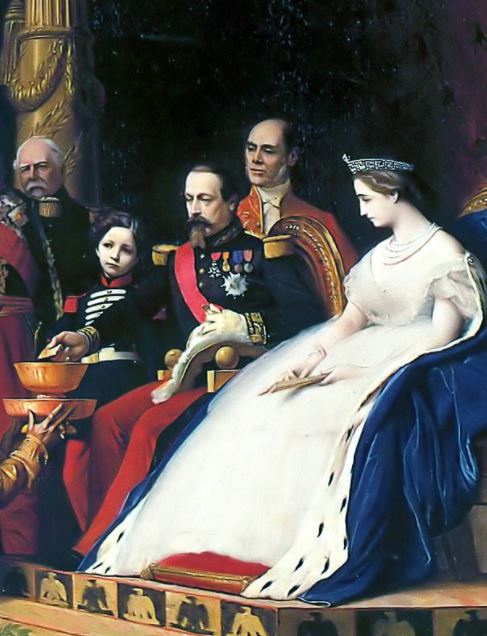
Napoleon III and his family
Napoleon the Fourth? Was there ever such an emperor? Strangely enough, the Zulus in South Africa can tell you more about this personage than an average Frenchman. The Zulus know him as Prince Imperial and, each year, they celebrate his anniversary with the local version of pomp and circumstance. And why wouldn’t they if there is good tourist money in it?

 Follow the road sign and you can visit the Prince Imperial’s museum, his memorial financed by Queen Victoria, and the battlefields of the Zulu War. You’ll be retracing Empress Eugenie’s pilgrimage the year after her son’s death. If you happen to be on this road on the first Sunday in June, you can participate in a mass for his soul celebrated in French, English, and Latin.
Follow the road sign and you can visit the Prince Imperial’s museum, his memorial financed by Queen Victoria, and the battlefields of the Zulu War. You’ll be retracing Empress Eugenie’s pilgrimage the year after her son’s death. If you happen to be on this road on the first Sunday in June, you can participate in a mass for his soul celebrated in French, English, and Latin.
Except for a few die-hard Bonapartists, Napoleon the Fourth may be forgotten in his homeland. For most of his short life, he was known as Prince Imperial, the heir to the French throne. In his childhood, he was the darling of the nation and, as he grew into a handsome young man, he became the treasured secret of many a young girl’s heart. He was to the French what John Kennedy Jr. was to the Americans, and it is easy to understand that his premature death at the age of twenty-three caused consternation and grief for the whole nation.
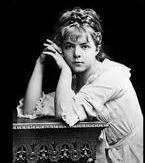
Marie Bashkirtsheff, a Russian art student in Paris, tells us about this somber day in her diary:
As I was about to leave the studio at noon yesterday, Julian called to the servant through the speaking tube; she put her ear to the tube, and she said to us with some emotion:
“Ladies, M. Julian desires me to tell you that the Prince Imperial is dead.”
I gave a cry and sat down on the coal-box. Then, as everyone began to talk at once, Rosalie said:
“A moment of silence, if you please, ladies. The news is official; a telegram has just been received. He has been killed by the Zulus; this is was M. Julian says.”
The news had already begun to spread; so that when they brought me the Estafette with the words in capital letters, “Death Of Prince Imperial,” I cannot express how much I was shocked.
And then, no matter to what party one may belong, whether one be a Frenchman or a foreigner, it is impossible to avoid sharing in the feeling o consternation with which the news has been everywhere received.
One thing I will say, however, which none of the papers has said, and that is that the English are cowards and assassins. There is something mysterious about this death: there must be both treachery and crime at the bottom of it. Was it natural that a prince on whom all the hopes of his party were fixed should be thus exposed to danger, an only son?
I think there is no one devoid of feeling as not to be moved at the thought of his mother’s anguish. The most dire misfortune, the crudest of losses, may still leave some gleam of hope in the future, some possibility of consolation. This leaves none. One may say with truth that this is a grief like no other. It was because of her [Empress Eugenie] that he went; she gave him no peace; she tormented him; she allowed him no more than five hundred francs a month, a sum upon which he could hardly contrive to live. The mother and son parted on bad terms with each other. Do you perceive the horror of the thing? Can you understand how his mother must feel?
England has treated the Bonapartes shamefully on every occasion when they were so blind as to ask the help of that ignoble country, and it fills me with rage and hatred when I think of it.”
Thus spoke Marie in her youthful grief. That she seemed well-informed of the tensions between mother and son, tells us that she was an avid reader of the gossipy newspapers which began to bloom in that era. As for England’s bad treatment of the exiled Bonapartes, she could not be more wrong. There was a solid friendship between the British royalty and the Bonapartes that was born during Victoria and Albert’s visit to France in 1855. You can read about it in The Prince of Wales in Paris: Please Adopt Me! published here. Queen Victoria figured in Prince Imperial’s life on many occasions. To begin with, when Eugenie complained about the difficulty of getting pregnant, it was her good friend Victoria, mother of a large family, who gave her a valid advice which resulted in the prince’s birth.
Several sources reveal that Victoria reserved for him her youngest daughter Beatrice as a spouse regardless of the fact that after the Second Empire’s collapse in 1870 he became an heir without a throne. Like the Bonapartes, Victoria believed that her dear Loulou would reconquer his lost empire. So did the still strong Bonapartist party in the now Republican France. Upon his father’s death in 1873, the young prince became Emperor Napoleon IV by the Bonapartists’ acclamation. It was—they hoped—only a question of time for the rightful ruler to claim his throne.
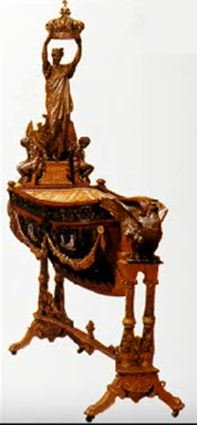 Napoléon Eugène Louis Jean Joseph Bonaparte, or Loulou to his family, was born March 16, 1856, and spent his early days in this splendid crib donated by the City of Paris. His godparents were Queen Victoria and Pope Pius IX. As the only child, he had no one to play with and his main entertainment was watching the guard maneuvering in front of the palace windows. His love for the military was born there. Sometimes, he would also play at governing. Sitting at his father’s desk, he would seize important documents and fold them into animal forms. His adoring father would not dare to protest. As an aside, had he lived and cultivated his talent for sculpture, Loulou could have become a brilliant artist. There were many promises in the boy’s life, all of them unfulfilled.
Napoléon Eugène Louis Jean Joseph Bonaparte, or Loulou to his family, was born March 16, 1856, and spent his early days in this splendid crib donated by the City of Paris. His godparents were Queen Victoria and Pope Pius IX. As the only child, he had no one to play with and his main entertainment was watching the guard maneuvering in front of the palace windows. His love for the military was born there. Sometimes, he would also play at governing. Sitting at his father’s desk, he would seize important documents and fold them into animal forms. His adoring father would not dare to protest. As an aside, had he lived and cultivated his talent for sculpture, Loulou could have become a brilliant artist. There were many promises in the boy’s life, all of them unfulfilled.
The following six-minute video records the young man’s life from birth to death. We see the delightful child growing into a Prince Charming, we follow him to exile in England, and from there to South Africa, and witness his heroic death at the hand of the Zulu warriors. We assist at his funeral in England and see his mother’s grief. The old empress then remembers happier times.
Marie was also wrong about the conspiracy regarding the prince’s death in South Africa. On the contrary, the British Army and the government freaked out at the idea of taking responsibility for the young man’s life. They wanted nothing to do with him and it took the joibt effort of Eugenie and Victoria, with the special order from the latter, for him to be enlisted for the war in Zululand. Even at that, he was scrupulously kept away from the real action. Both women believed that the prince needed to cover himself with glory in order to succeed in his conquest of the crown. As for the man himself, he did not need any encouragement. Eager to become a worthy heir of his famous great-uncle, Napoleon I, he studiously sought danger to the chagrin of his British “baby-sitters”. He found his death in a seemingly deserted kraal where he decided it was time for a coffee break during a reconnaissance ride. In the video that follows, the event is reconstructed based on the statements given the following day by the members of the patrol.
 There remain many what-if questions. What would have happened had the uncrowned Napoleon IV not lost his life that day? Would he have recovered his throne and brought back the Empire? How would that have changed France’s and, to some degree, Europe’s destiny? Queen Victoria might have hoped to establish her youngest daughter as the Empress of France, but would the French have gone for it? That remains doubtful. Would they have unanimously accepted an emperor who had been schooled in England, served in the British army and married a British Protestant princess? Questions, questions…
There remain many what-if questions. What would have happened had the uncrowned Napoleon IV not lost his life that day? Would he have recovered his throne and brought back the Empire? How would that have changed France’s and, to some degree, Europe’s destiny? Queen Victoria might have hoped to establish her youngest daughter as the Empress of France, but would the French have gone for it? That remains doubtful. Would they have unanimously accepted an emperor who had been schooled in England, served in the British army and married a British Protestant princess? Questions, questions…
Related posts:
.
If you enjoy these posts, support the author by buying her books on Amazon:

